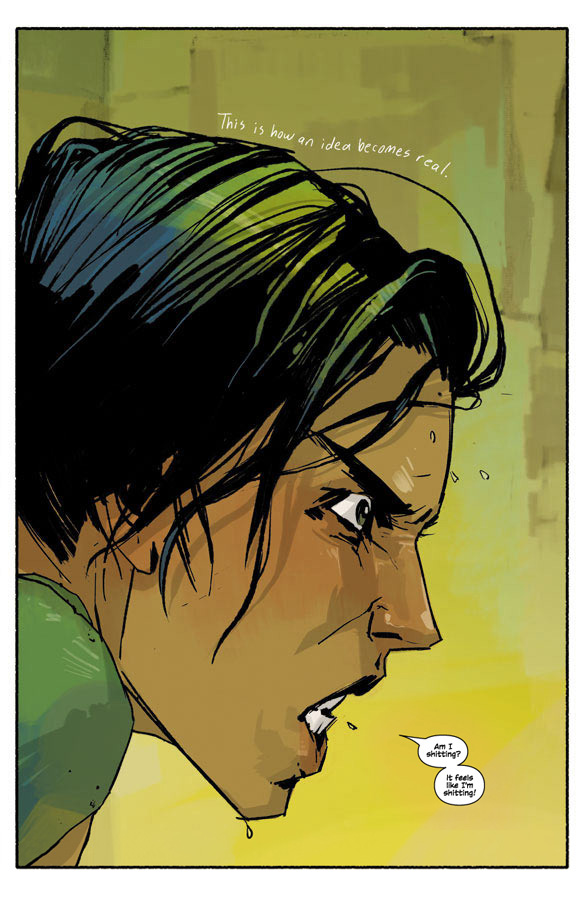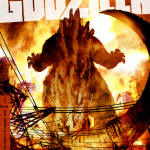A couple of weeks back, I attended my first Baltimore Comic-Con. It clocked in at around 15,000 people, and unlike the bigger Comic-Cons (NYCC or PHXCC) that I’ve attended, Baltimore was still very much focused on comics.
After two days of panels, browsing, meeting creators, and loading my bags down with glorious comics goodness, I should have expected this to happen.
Sometime during the weekend, I was bitten by a radioactive comics bug. It re-awakened my often-deferred interest in writing for the form.
I grew up reading comics, taking the change from our recycling deposits down to the friendly local comic shop in Brooklyn to buy the latest issue of Spider-Man, Batman, or X-Men. I’ve tried my hand at writing comics scripts only a little bit, but often thought about what it’d take to move into that form.
Now, let me be clear that I have no intentions of leaving prose writing. That’s my home base, and I’m not likely to ever stop writing prose. But more and more, I see writers crossing formats, including several of my writing idols (Neil Gaiman, China Mieville, Greg Rucka, among others).
Therefore, the last couple of weeks, I’ve been devouring comics, deepening my immersion in the form, investigating what’s going on at the top of the form with the works that are making waves and pushing at the edges of what the form can and is doing.
Here’s a representative sample of my research list:
- Saga (Brian K. Vaughn and Fiona Staples)
- The Wicked + the Divine (Kieron Gillen and Jamie McKelvie)
- Batwoman (JH Williams III and W. Haden Blackman)
- Lumberjanes (Grace Ellis, Noelle Stevenson, and Brooke Allen)
- Gotham Central (Ed Brubaker, Greg Rucka, and Michael Lark)
- Rat Queens (Kurtis J. Wiebe and Roc Upchurch)
- Ms. Marvel (G. Willow Wilson and Adrian Alphona
- Velvet (Ed Brubaker and Steve Epting)
- Lazarus (Greg Rucka and Michael Lark)
- Global Frequency (Warren Ellis and various artists)
- Chew (John Layman and Rob Guillory)
- Atomic Robo (Brian Clevinger and Scott Wegener)
I’ve also been diving into some craft books, and revisiting some others I’ve already read:
- Words for Pictures – Brian Michael Bendis
- Writing for Comics and Graphic Novels – Peter David
- Understanding Comics – Scott McCloud
- Making Comics – Scott McCloud
- Save the Cat – Blake Snyder
Lessons learned so far
Transcribe
One of the best things I did in trying to deepen my understanding of the differences between writing prose and writing for comics was to open my copy of Saga Vol. 1 and transcribe the finished comic back into a script, trying to capture the visuals, emotion, and to see how much text fit on the page.

Saga, Issue #1 page 1. From Image Comics. (C) Brian K. Vaughn and Fiona Staples
Script != Finished Page != Script
The biggest challenge I’ve faced so far coming to comics writing is that the finished product is drastically different from the working document that a comics writer will produce. When learning prose writing, you can look at a piece of fiction and see the final draft as the actual product. But in comics, there’s so much of a collaboration and melding of the styles and skills of several creators (sometimes as many as six: writer, penciler, inker, colorist, letterer, editor, graphic designer) that a writer’s script is only one part of the equation. For me, that makes it harder to tease out where my part is, especially writing without having yet found any collaborators. I want to write some scripts and see how well my novelist chops translate before trying to make finished comics, and then start reaching out when I’m confident that I’ve learned the comics form well enough to start making professional works.
Basically, It’s Writer Multi-Classing
I’ve written seven novels (two of which are trunked, never to be seen again), and a long novella, as well as a couple dozen short stories. In D&D terms, I’m somewhere in the 3-5th level in terms of my Prose Writer class. But this, this is taking a new class – Comics Writer. There are different skills, different class abilities, and a whole power tree of collaboration powers for when you’re in a party with other comics creators. So while my overall Writer level combines my Prose Writer and Comics Writer levels (like a Wizard taking a level of a prestige class), my Comics Writer level is still 1 right now, so there’s a weird feeling of starting over, of going back to square one. I know a lot about storytelling, but the format, the medium is very different, and I’m having to learn to adjust to it, just like I adjusted from storytelling in RPGs to storytelling in prose.
Choosing Your Moment
Since the comics form is one where moments (panels) are compressed into a fluid narrative experience by the reader, one of the most important tasks for a creator is to chose your moments, to pick which snapshot in the action to depict in a panel, as well as how to space out your moments – several panels showing moments very close together, or jumping farther in time between panels. This is not unlike the task of scene selection in prose writing, or picking where to dramatize within a scene, but it’s very much its own thing in comics.
The Business End
I work in SF/F prose publishing. I’ve been learning about the trade publishing industry, and SF/F prose publishing in specific, for around a decade. It has certain processes, customs, and paths to publication.
Comics, unsurprisingly, is different. I’ve asked questions about submission and breaking in to creators and publisher staffers at the various comic-cons I’ve attended, and I’ve received incredibly divergent answers.
Here’s how to break in, as I’ve been told:
- Self-publish your own works and the editors will find you.
- Send everything you make to the editors you want to work with.
- Pay an artist to do a whole graphic novel and then try to sell it to publishers.
- Pitch editors with ideas and then they’ll ask for scripts. Then they’ll find you an artist.
- Submit a complete 8-page comic.
- Submit a full 22-page comic.
- Self-publish for a while and then try to pitch a new project to publishers.
- Look for comics anthology invites and start there.
As you might be able to tell, that’s a fair range. The fact that I have several novels out from traditional publishers changes the game for me somewhat, but it doesn’t give me one clear path to publication. In prose publishing, you can query agents, who then pitch to editors. There are other paths as well, but this is the ‘standard’ path. Comics doesn’t seem to have as clear a ‘standard’ path to publication. (Note that the standard path in prose publishing is often anything but easy. But it is the default, one that takes an unpublished debut work and then gets it sold to a publisher).
As you’ll note, this post says ‘Part One.’ I’ll keep talking about my experiences moving into comics writing, both to remember what the process was like, and to (hopefully) cast some light on the journey for other writers interested in moving into comics, either from a prose background or not.

